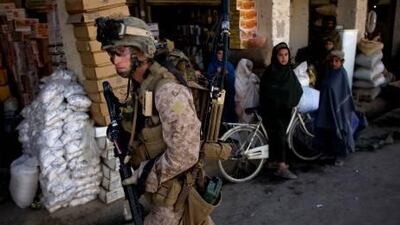Charare Qamber, Afghanistan //For refugees from Afghanistan's Sangin district living in this squalid slum outside Kabul, reports of a peace deal between US forces and local tribes are inspiring little hope.
US officials announced last week that leaders of the Alikozai tribe in Sangin, in the southern Afghan province of Helmand and one of the country's most dangerous districts, had pledged to halt insurgent attacks and expel Taliban fighters in exchange for international aid.
Some western analysts lauded the deal as a crucial bellwether for greater security gains in the country's troubled south, where foreign troops are under pressure to protect civilians and deliver on promises of more aid and improved infrastructure.
But interviews with Sangin natives living in Kabul's Charare Qamber camp - a sprawl of mud homes housing more than 1,000 displaced families from Helmand and Kandahar provinces - revealed that those forced to flee the area's years of violence had either little knowledge of the pact or placed minimal hope in its ability to pave the way for their return home.
The disparity between the optimism of US military officials heralding the Sangin deal and the low expectations of Afghan civilians who should potentially benefit from it highlights the difficulty foreign troops face in gaining the trust of local populations after 10 years of war.
"In my opinion, the deal won't last long," said Mira Jan, a 55-year-old refugee from Sangin.
On this Friday afternoon in Charare Qamber, about two dozen refugees from Sangin, their faces caked with dirt and lined by years of hardship and conflict, gathered in the bitter cold to tell their stories.
"Maybe the Alikozai will pay the Taliban, and they will stop attacking for a short time," said Mira Jan, as the others nodded in agreement. "But I know the Taliban. They were in my village, and they will not put their guns down until the Americans are gone."
US marines took control of Sangin in September after UK forces had presided over the district's spiral into a lawless, violent hub for Taliban insurgents and drug traffickers since 2006. More than 100 British soldiers were killed during the four years they battled insurgents in the district.
Helmand province produces more than 90 per cent of the world's opium, according to figures from the United Nations Office on Drugs and Crime, and Sangin is a centre for Taliban-run heroin labs.
But US military officials said they pushed for a security agreement with the Alikozai tribe. Although ethnic Pashtuns like the Taliban, the tribe has a history of resistance to the Islamist movement.
The Sangin deal also calls on local residents to notify foreign troops of homemade bombs and ensure safe passage for marine foot patrols in the area.
But 43-year-old Mullah Sher, from a village in the Upper Sangin Valley, said that though he received word of the peace deal through relatives, he won't return until foreign soldiers have left Afghanistan.
He announced the news of the agreement to his congregation at Friday morning prayers in one of the camp's makeshift mud mosques.
"I told the people that the Americans and the [Afghan] government asked the Alikozai tribe to negotiate with the Taliban, but that the Taliban said they will not stop the war," Mullah Sher said.
"We have all lost family members, children. There are people coming from Sangin every day to this camp," he said. "How can we believe there will actually be peace?"
There are already reports of revenge attacks by Taliban insurgents against Alikozai leaders in Sangin, but Taliban spokesmen deny lashing out at the tribe.
"The insurgents have already begun to strike back savagely at those who desire peace, but so far the elders remain steadfast," US marine Maj Gen Richard Mills, the commander of coalition forces in the south-west of Afghanistan, said in a statement last week. "We are cautiously optimistic of this agreement and will monitor insurgent activity," he added.
For Said Ali, a 30-year-old Sangin refugee and self-identified member of the Alikozai tribe, the words of a US general are not enough.
"I would go back today if I thought my family would be safe," he said. "Look at me, I live like an animal in this camp. But it's better than being dead."

